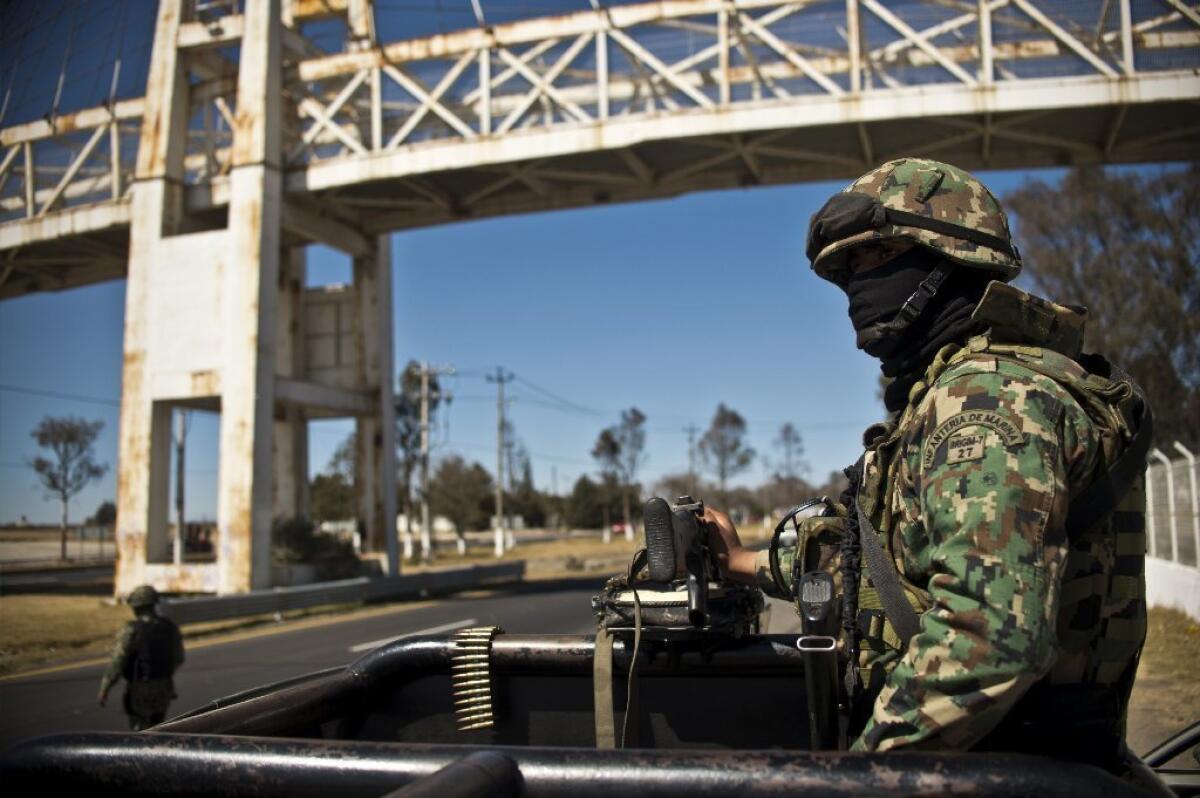New government, old problems as Mexico suffers from criminality

- Share via
MEXICO CITY -- A police chief in the border city of Nuevo Laredo goes missing after his brothers turn up dead. Early evening explosions in front of a government building in the capital of Tamaulipas state injure three people. In the state of Durango, the businesses of a mayor’s family are burned days after her home is attacked by gunmen.
As Mexico’s new government continues to fine-tune its public safety plan, distressingly familiar acts of criminality continue unabated, as seen in headlines that have dominated newspapers this week.
The continuing stream of bad and bloody news presents a challenge for President Enrique Peña Nieto, who took office Dec. 1 and is hoping to shift the world’s attention away from Mexico’s scourge of violence to focus more on the country’s growing economy.
In January, according to the federal government, the country witnessed 1,104 homicides linked to organized crime. The newspaper Reforma notes that 1,808 such slayings have taken place since Peña Nieto’s swearing-in. In some states, fed-up locals have donned ski masks and taken up arms; these “self protection” groups have taken it upon themselves to round up suspected criminals, set up roadblocks and enforce curfews.
For the time being, many Mexicans appear willing to give the new administration time to solve what they consider the country’s No. 1 problem. In a poll of 1,000 adults conducted this month by the Mexico City newspaper El Universal, 56% of respondents said they approved of Peña Nieto’s job thus far.
Respondents also ranked “insecurity and crime” as the most urgent issue facing the country, ahead of unemployment and poverty.
Mexico’s previous president, Felipe Calderon, deployed the army to crack down aggressively on the country’s criminal cartels beginning in December 2006, resulting in an estimated 70,000 deaths. Peña Nieto’s government plans to keep the military in the streets for the time being, but it intends to create a national paramilitary “gendarmerie” to eventually take over. In addition, new federal police units will focus exclusively on the widespread practices of extortion and kidnapping.
The Nuevo Laredo police chief, Roberto Alejandro Balmori Garza, disappeared Sunday, the same day that his two brothers turned up dead, according to news reports. The state attorney general has launched an investigation to find him.
Nuevo Laredo -- set across the Rio Grande from a lonely stretch of southeastern Texas -- has been a cartel battleground for years. Two police chiefs there have been slain since 2005.
The explosions occurred Tuesday evening in Ciudad Victoria, the capital of Tamaulipas state, of which Nuevo Laredo is a part. The state attorney general said the explosive devices were thrown from a car. Three men were injured, though not seriously. In a prepared statement, Tamaulipas Gov. Egidio Torre Cantu implied that the attacks came from organized criminals and were “merely reactions” to the crackdown efforts of state and federal authorities.
In the city of Gomez Palacio, in the northwestern state of Durango, Mayor Rocio Rebollo Mendoza told reporters she didn’t know why her house had been shot up this month, or why four of her family’s businesses were burned Monday. She said she hadn’t received threats or warnings from anyone.
In January, according to the news service Infomex, 47 members of the Gomez Palacio police force were arrested for alleged ties to organized crime, along with 109 officers from a neighboring municipality.
In the last six years, 45 mayors and former mayors have been killed in Mexico, according to the University of San Diego’s Trans-Border Institute.
ALSO:
Vigilantes reportedly release captives in southern Mexico
Facebook page in Mexico draws attention for posts on security risks
Mexican forces involved in kidnappings, disappearances, report charges
More to Read
Sign up for Essential California
The most important California stories and recommendations in your inbox every morning.
You may occasionally receive promotional content from the Los Angeles Times.










